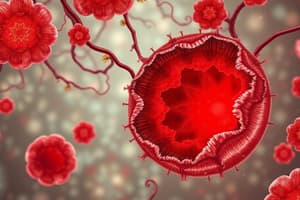Podcast
Questions and Answers
What is a characteristic of hematopoietic stem cells (HSCs)?
What is a characteristic of hematopoietic stem cells (HSCs)?
- They are negative for CD117.
- They are committed solely to myeloid lineages.
- They possess self-renewal capacity. (correct)
- They can only differentiate into red blood cells.
Which of the following markers is expressed by hematopoietic stem cells?
Which of the following markers is expressed by hematopoietic stem cells?
- CD19
- CD38
- CD3
- CD34 (correct)
What defines the multipotentiality of hematopoietic stem cells?
What defines the multipotentiality of hematopoietic stem cells?
- Their complete lack of differentiation potential.
- Their gradual restriction in self-renewal capacity.
- Their capacity to differentiate into all mature hematopoietic cell lineages. (correct)
- Their ability to produce only lymphoid cells.
Which cells are the first committed to lymphoid and myeloid lineages?
Which cells are the first committed to lymphoid and myeloid lineages?
What is the implication of HSCs demonstrating a limited capacity to self-renew over time?
What is the implication of HSCs demonstrating a limited capacity to self-renew over time?
At what stage of gestation does hematopoiesis begin in the liver?
At what stage of gestation does hematopoiesis begin in the liver?
What structure serves as the primary site of hematopoiesis after 24 weeks of gestation?
What structure serves as the primary site of hematopoiesis after 24 weeks of gestation?
Which cells are considered common precursors to both endothelial and hemopoietic cells?
Which cells are considered common precursors to both endothelial and hemopoietic cells?
What is the estimated ratio of hematopoietic stem cells (HSC) to nucleated cells in the bone marrow?
What is the estimated ratio of hematopoietic stem cells (HSC) to nucleated cells in the bone marrow?
Which of the following bones contains hemopoietic marrow at puberty?
Which of the following bones contains hemopoietic marrow at puberty?
What significant transition occurs in hematopoiesis at about 10-12 weeks of gestation?
What significant transition occurs in hematopoiesis at about 10-12 weeks of gestation?
During which period is hematopoiesis observed in the spleen and lymph nodes?
During which period is hematopoiesis observed in the spleen and lymph nodes?
At birth, what is the characteristic of the bone marrow throughout the body?
At birth, what is the characteristic of the bone marrow throughout the body?
What fate does a hematopoietic stem cell NOT undergo after replication?
What fate does a hematopoietic stem cell NOT undergo after replication?
Which cytokine plays a major role in maintaining the quiescent state of hematopoietic stem cells?
Which cytokine plays a major role in maintaining the quiescent state of hematopoietic stem cells?
What is the process called when hematopoietic stem cells move out of the bone marrow?
What is the process called when hematopoietic stem cells move out of the bone marrow?
Which of the following is the earliest characterized progenitor in the erythroid lineage?
Which of the following is the earliest characterized progenitor in the erythroid lineage?
Which factor is essential for the proliferation of BFU-E progenitor cells?
Which factor is essential for the proliferation of BFU-E progenitor cells?
What occurs after lineage commitment of progenitor cells?
What occurs after lineage commitment of progenitor cells?
What are terminally differentiated cells found in the blood collectively referred to as?
What are terminally differentiated cells found in the blood collectively referred to as?
Which of the following is NOT a process that descendants of hematopoietic stem cells may undergo?
Which of the following is NOT a process that descendants of hematopoietic stem cells may undergo?
Flashcards
Hematopoietic Stem Cell (HSC)
Hematopoietic Stem Cell (HSC)
A cell with the ability to self-renew and differentiate into all blood cell types.
Self-renewal capacity
Self-renewal capacity
The ability of a stem cell to create identical copies of itself, ensuring a constant supply of stem cells.
Common Lymphoid Progenitor (CLP)
Common Lymphoid Progenitor (CLP)
A cell that differentiates into lymphoid blood cells.
Common Myeloid Progenitor
Common Myeloid Progenitor
Signup and view all the flashcards
Multipotent Stem Cell
Multipotent Stem Cell
Signup and view all the flashcards
What happens after HSC self-renewal?
What happens after HSC self-renewal?
Signup and view all the flashcards
What are the stages of HSC commitment?
What are the stages of HSC commitment?
Signup and view all the flashcards
What is the role of cytokines in HSC fate?
What is the role of cytokines in HSC fate?
Signup and view all the flashcards
What is HSC quiescence?
What is HSC quiescence?
Signup and view all the flashcards
What is HSC mobilization?
What is HSC mobilization?
Signup and view all the flashcards
What is HSC homing?
What is HSC homing?
Signup and view all the flashcards
What is the earliest erythroid progenitor?
What is the earliest erythroid progenitor?
Signup and view all the flashcards
What factors are required for BFU-E?
What factors are required for BFU-E?
Signup and view all the flashcards
Where does hematopoiesis begin?
Where does hematopoiesis begin?
Signup and view all the flashcards
What is the AGM region?
What is the AGM region?
Signup and view all the flashcards
What is the role of the liver in hematopoiesis?
What is the role of the liver in hematopoiesis?
Signup and view all the flashcards
What is the timing of bone marrow becoming the primary site of hematopoiesis?
What is the timing of bone marrow becoming the primary site of hematopoiesis?
Signup and view all the flashcards
What is the significance of the bone marrow microenvironment?
What is the significance of the bone marrow microenvironment?
Signup and view all the flashcards
Where is hemopoietic marrow located?
Where is hemopoietic marrow located?
Signup and view all the flashcards
When does bone marrow become replaced by fat?
When does bone marrow become replaced by fat?
Signup and view all the flashcards
How rare are hematopoietic stem cells?
How rare are hematopoietic stem cells?
Signup and view all the flashcards
Study Notes
Hematopoiesis Course
- Hematopoiesis is the process of blood cell formation
- Blood is a suspension of non-dividing cells
- Red blood cells (RBCs) deliver oxygen
- Platelets are involved in hemostasis
- White blood cells (WBCs) are part of the immune system
Intended Learning Outcomes
- Define hematopoiesis
- Describe the bone marrow microenvironment
- Describe and identify hematopoietic cell types
- Identify hematopoietic growth factors
Course Outlines
- Normal Blood Cell Synthesis (Hematopoiesis)
- Red Blood Cell Disorders
- White Blood Cell Disorders
- Bleeding Disorders
- Blood Transfusion Complications
- Spleen and Thymus Disorders
Components of Blood
- Plasma
- White Blood Cells (WBCs)
- Red Blood Cells (RBCs)
- Platelets
Sites of Hematopoiesis
-
Fetal Development:
- Yolk sac (early)
- Liver (mid-development)
- Spleen (later fetal stages)
- Bone marrow (takes over around 5 months gestation)
-
Postnatal: Bone marrow is the primary site for blood cell production
Hematopoietic Stem Cells (HSCs)
- Rare cells in bone marrow
- Self-renewal capacity
- Can differentiate into all blood cell types
- Regulated by cytokines (e.g., TGF-β)
- Have possible fates including:
- Self-renewal
- Differentiation
- Migration
- Apoptosis
Erythropoiesis
- Production of red blood cells
- Erythropoietin (EPO) is a key hormone regulating this process
- Occurs in bone marrow via stages including cells like proerythroblast, basophilic, polychromatophilic, and orthochromic
Myelopoiesis
- Production of various white blood cell types
- Begins from CFU-GEMM to CFU-G/Eo/M/baso
- Includes cells like myeloblasts, promyelocytes, myelocytes, metamyelocytes, bands, and mature cells (neutrophils, basophils, eosinophils)
Lymphoid Cell Development
- Development of lymphocytes (T cells and B cells)
- Involves stages in bone marrow (B cells) and thymus (T cells)
- Regulated by various growth factors and cytokines
Hematopoietic Growth Factors
- Cytokines play a critical role in hematopoiesis
- Stimulate cell proliferation, differentiation, and maturation
- Influence various stages of blood cell development
Studying That Suits You
Use AI to generate personalized quizzes and flashcards to suit your learning preferences.




